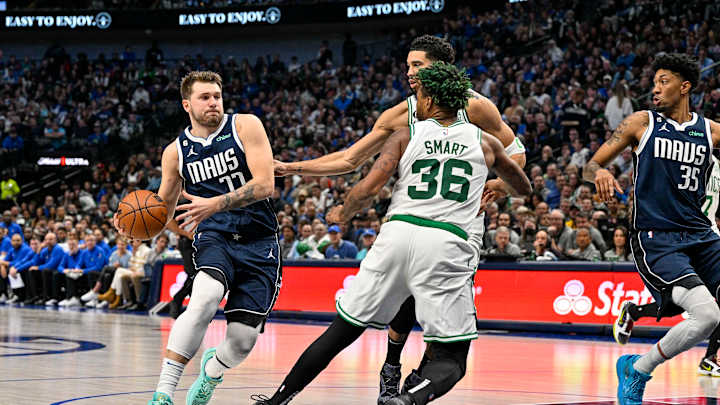[Film Room] the Primary Problem Plaguing the Celtics' Crunch-Time Defense

You might not like how the Celtics' crunch-time offense operates and feel like it's too iso heavy. It's a fair criticism. Even more valid is the concern their late-game after-timeout (ATO) sets lack variety.
When needing a bucket, Boston often stations Jayson Tatum in the backcourt. Either he gets the inbound and comes downhill with momentum, or he has a running start, increasing the odds of him going to the rim, like when he posterized Jarrett Allen.
JAYSON TATUM PUNCHED ON ALLEN😳 pic.twitter.com/i0Lt15BLpj
— Celtics on NBC Sports Boston (@NBCSCeltics) November 3, 2022
And there's definitely a need for the Celtics to trust someone else, namely, Jaylen Brown, to come through with the game on the line on nights Tatum's struggling to find his rhythm.
In Boston's 118-117 loss to the Jazz, despite the four-time All-Star being scoreless in three of four quarters, including the final frame, he got the defending Eastern Conference champions' second-to-last shot, a badly bricked pull-up three.
The intention on their final attempt was to get him the ball from Grant Williams on a dribble handoff, but as they addressed post-game, the play went haywire.
Walker Kessler denies Grant Williams and secures a 19-point comeback win for Utah! 🎺
— theScore (@theScore) March 19, 2023
(🎥: @NBA)pic.twitter.com/rpibpgxm9S
After the defeat, which dropped the Celtics to third in the East, Tatum said he has no issue with someone else taking the game-deciding shot.
"Yeah (I'm good with that)," he stated. "I ain't got no ego or nothing like that. I'm just trying to win."
But for all the concerns about Boston's crunch-time offense, the Celtics are generating 10.6 points per contest, the third-most in the final five minutes of games within five points, per NBA.com.
Since Dec. 1, they're averaging 10.5 points in crunch time, second to the Kings (11.9). And even though they're 7-6 since the All-Star break, including 5-4 in games within five points in the final five minutes, they've only dropped to eighth in this category, manufacturing 11.7 points per game in the clutch.
Maybe the lack of creativity and over-reliance on Tatum proves costly in the playoffs, but the more-pressing crunch-time issue for Boston is how poorly it's playing at the other end of the floor.
According to NBA.com, the Celtics rank 21st in points allowed per game in the clutch, yielding 9.4. Since the All-Star break, in the nine crunch-time contests they've been in, they're surrendering an average of 12 points, which ranks 22nd.
Boston's defense was its backbone last season. It's what the defending Eastern Conference champions rode to the NBA Finals, coming within two wins of capturing banner 18. Taking on a defensive identity again is a more likely path to a title than overly relying on threes. Just ask Jaylen Brown.
Limiting teams to one shot per possession has been a problem, especially without Robert Williams. Since the All-Star break, the Celtics rank 18th in second-chance points surrendered in the clutch, allowing 1.3 per contest, per NBA.com. For the season, they're giving up 1.1, which ranks 12th.
And from being shorthanded to the reality that there will be nights during an 82-game campaign where a team's energy and effort aren't up to par, like Boston's loss to the Rockets, one can find plenty of reasons to grade leniently. Plus, the rules help the offense more than the defense.
But too often, what you see in crunch time is a defense that's not connected.
In the play above, the Knicks run a Horns set, with Julius Randle and Mitchell Robinson setting high-ball screens on both sides of Marcus Smart.
The way Smart's shading Immanuel Quickley, with his hips closed, suggests he's expecting Williams to switch onto the former Kentucky Wildcat. When Randle runs across the three-point line, there's no communication despite the defense needing to adapt.
Along with Tatum coming off Robinson, the breakdown forces Al Horford to pinch in, leaving Josh Hart open for a corner three that ties the game.
Against the Timberwolves, with the Celtics leading by four and 2:04 remaining, Brown passes off Rudy Gobert to Horford. But he doesn't take note of Kyle Anderson coming up to screen for Anthony Edwards, even though Horford points it out to him.
The result is a clean look from behind the arc, but the former first-overall pick's shot draws iron.
Late in Saturday's loss to the Jazz, Brown picks up Talen Horton-Tucker when the latter comes off a staggered screen. Williams and Malcolm Brogdon initially go with Kelly Olynyk as he dives to the rim, leaving Utah's best player, Lauri Markkanen, open for three.
Even though the Celtics employ a switch-heavy scheme, it's unclear who's in the wrong. It's more important they sort it out to avoid repeating this mistake in the postseason.
Everyone needs to be on the same page. What happens before crunch time matters, and between the possibility someone fouls out or Boston, a team that's rarely been at full strength, is shorthanded, at least one of them might find themselves in this situation again but with higher stakes.
Lastly, while the Celtics will likely sink or swim with their starting lineup when all five are available in the closing minutes of playoff games, when there's an absence, especially if it points toward being better off with two guards on the floor as opposed to two bigs, Joe Mazzulla has to find opportunities for Derrick White. He's been Boston's best defender and third-most impactful player this season.
Even at full strength, if White's play warrants him being in at the end of a game over Smart, Mazzulla should make the switch. It's about doing what's best for the team.
And while no one expects Smart or anyone in that situation to be happy about it, that's also a potential plus, as it should serve as motivation moving forward.
Further Reading
Celtics Discuss What Went Wrong on the Final Play in Their Loss vs. the Jazz
Here's What Stood Out in Celtics' Loss vs. Jazz: Boston Outplayed in Crunch-Time
Al Horford and Marcus Smart Credit Joe Mazzulla for Celtics' Recent Success
